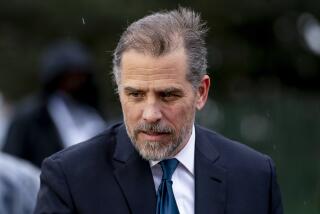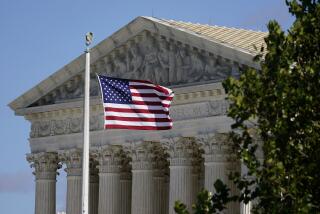Tax ‘Protesting’ Ruled Not ‘Willful’ Evasion
- Share via
WASHINGTON — Americans who refuse to pay their federal income tax because they sincerely believe the tax law is unconstitutional cannot be convicted of “willful” tax evasion, the Supreme Court ruled today.
The ruling does not shield them from paying taxes and penalties, however.
The 6-2 decision set aside the conviction of John L. Cheek, an American Airlines pilot who filed no federal income tax returns for six years in the 1980s.
Writing for the court, Justice Byron R. White said someone’s good-faith belief that federal taxes on their wages are unlawful--no matter how unreasonable that belief--does not make a person guilty of a crime requiring willful action.
Ignorance of the law or a mistake of law is no defense, White said. But he added, “If Cheek asserted that he truly believed that the Internal Revenue Code did not purport to treat wages as income, and the jury believed him, the government would not have carried its burden to prove willfulness, however unreasonable a court might deem such a belief.”
The jury that convicted Cheek in 1987 was told that he should be found guilty of willful violations of tax laws unless his asserted misunderstanding of the laws was “objectively reasonable.”
His conviction in Chicago drew a sentence of a year and a day in prison and five years probation.
Today’s decision means that federal prosecutors must retry Cheek, who stopped paying federal taxes in 1979. He became what lower courts called “a tax protester.”
At his trial, Cheek testified that in 1978 he began attending seminars sponsored by a group that believes that the federal tax system is unconstitutional. Cheek produced a letter from an attorney stating that the Constitution authorizes a tax only on profit.
Justices Harry A. Blackmun and Thurgood Marshall dissented.
“It is incomprehensible to me how, more than 70 years after the institution of our present federal income tax system . . . any taxpayer of competent mentality can assert as his defense to charges of statutory willfulness the proposition that the wage he receives for his labor is not income, irrespective of a cult that says otherwise,” Blackmun wrote.
More to Read
Inside the business of entertainment
The Wide Shot brings you news, analysis and insights on everything from streaming wars to production — and what it all means for the future.
You may occasionally receive promotional content from the Los Angeles Times.










